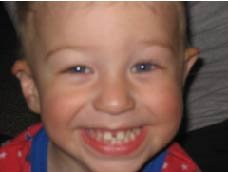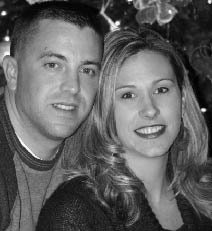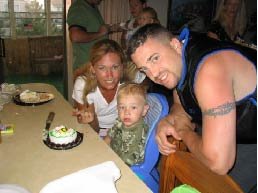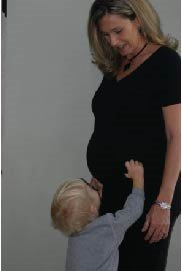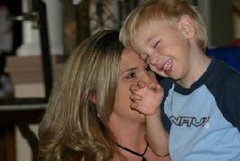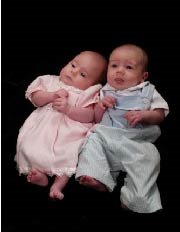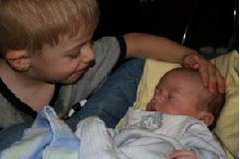Two years ago (May 10, 2005), I was delivered one of the most devastating realities that would shake any parent. I found out I was a carrier of Fragile X Syndrome and had passed on the full mutation to my son Caden Bray. Fragile X is the most common inherited cause of mental impairment. It is also the most common known cause of autism.
Now, two years later, it could be any morning...5 a.m...and I can’t fight back the tears. It’s not brought on by my newborn twins, Camden and Braylin, crying or aching for attention, they’re sleeping soundly - they are my miracle babies created in their brother's honor, the namesakes of their big brother Caden Bray.
He is now three and a half but has the mentality and cognitive ability of a two year old, even though he's 35 pounds and 38 inches tall, as strong as an ox and as cute as a button. It’s not exactly the way I like to start my day especially with little ones who still wake during the night. In the quiet of the morning, when others are sound asleep, I awake in tears of worry and frustration.
You may wonder what I have to cry about with the miracle of the twins being born healthy and our family finally complete. Simply put, I need a hero. I need someone to help me, help my family, help my son, with Fragile X.
Why the tears? Why now? Why two years after his diagnosis. Because I will fight until my last breath for him - it’s a combination of things. Caden’s third birthday was in September. His siblings were just born and we have all their milestones to look forward to - each milestone will be a powerful reminder of what Caden didn’t do compared to what typical children his age did or are now doing at his age.
At three, he should be talking in sentences, learning to ride a trike, and singing his ABC's.
At three, he should have friends, be interacting with his peers at daycare instead of isolating himself or pushing or biting them.
At three, he should be walking up and down stairs but his lack of muscle tone causes him to still use the banister.
At three, he should use a fork and a spoon but his hands are still his utensil of choice.
At three, he should be potty training but can only utter the word ‘potty’ with no idea of its purpose.
At three, he should be able to hug his parents and tell them "I Love You."
Instead, at just three, he’s held hostage by Fragile X.
I always wanted to be a mother - but this is not the life of motherhood that I signed up for. This is where the tears come in. We’ve had our ups and downs. We’ve been at the end of our rope. We’ve had a long stretch of not doing too bad. We pray he’s not one of the many Fragile X kids that develop seizures at the common age of five. We wonder how we will handle this if we are unlucky enough to encounter this in the future. Although I’m not one to feel sorry for myself, there have been times when I’ve felt like a battered woman wondering how many more of life’s fastballs I’m going to be able to hit out of the park. Sadly, I’ve got a few minor scars at the plate, yet the biggest scar won’t ever be seen with the naked eye, because it’s on my heart, which has been broken far too many times when I’ve been unable to help my son or think of how the future might treat him.
I want to be his hero but who will be my hero. The hero I’m looking for won’t be made of steel or have extraordinary powers. My hero is going to be that person or team that can improve the interventions that will help my son and others like him.
They’re going to be the men and women who have dedicated their life to science, attempting to unlock the mysteries of the human brain and the mystery behind Fragile X.
I don’t know what drives the Fragile X researchers or what’s behind their passion but I pray it never weakens. They’ve made remarkable breakthroughs since discovering the gene that causes Fragile X. They’ve made a medical breakthrough with the effects of a link between genetic mutations found in individuals with Fragile X and dysfunction in the metabotropic glutamate (mGluR) neurotransmitter system (the brain chemistry that allows cells to “talk to” each other).
Recently, noteworthy scientific breakthroughs included:
In a February issue of the journal, Public Library of Science Biology, the University of Wisconsin-Madison researchers reported that, in mice, the Fragile X mental retardation protein may regulate the material responsible for the plaques and cell death seen in the brains of Alzheimer's patients.
In March, the federal Food and Drug Association (FDA) granted an Orphan Drug Designation for an experimental new drug based on the metabotropic glutamate (mGluR) theory, that has the potential to reduce intellectual deficits and relieve the symptoms of Fragile X and will now go to human clinical trials.
I thought this was amazing and that Fragile X would finally make the New York Times. I thought there would be international news releases littered with information on Fragile X especially with all the autism press we've seen lately. Instead, the media focuses on Britney Spears shaving her head and the dysfunctional life and death of Anna Nicole Smith. It saddens me to think that one of the world’s leading causes of mental retardation, and a known genetic cause of autism, has relatively no public awareness, while other conditions are known in almost every household.
There is a strong possibility that this breakthrough will not only help those with Fragile X, but those with Alzheimer’s disease and autism as well. It would be a domino effect into a cure for other syndromes.
Fragile X researchers get little recognition, in the big scheme of things, and little funding. So why do they do it? They need to know that one mom (well many Fragile X moms) is counting on them. They are my heroes. They are the individuals who give me HOPE and keep my faith alive knowing that one day their research efforts will put an end to my heartbreak and provide a normal future for my son. Then, and only then, when I wake up at 5 a.m. I can worry about whether the coffee pot was set the night before or whether to hit the snooze button one more time.
In all honesty, I was never a big charity-giver before learning of Caden’s condition – out of sight, out of mind. I have since learned the importance of charity and have become the regional director for FRAXA, the Fragile X Research Foundation. I know we all have special charities or issues that are close to our hearts. I’ve given money to the Lance Armstrong Foundation as my mom and aunt both died of cancer. I’ve given to the Retts Syndrome Foundation because I work with someone whose little girl is affected. So if you want to be a part of a great charitable challenge for someone you know…be one of Caden’s heroes.
Doris Buffett, president and founder of the Sunshine Lady Foundation, has donated $500,000 to FRAXA, The Fragile X Research Foundation. Ms. Buffett has also promised to donate an additional $500,000, if FRAXA can raise $500,000 in new money by October 31, 2007. If you would like to help, please consider making a tax-deductible donation, in honor of “Caden Norton”.
FRAXA's mission is to find effective treatments and a cure for all children and adults with Fragile X. FRAXA has funded over $11 million in research at universities around the world.
To donate contact FRAXA at 978-462-1866 or donate online www.fraxa.org, or send a check made out to FRAXA Research Foundation, 45 Pleasant Street, Newburyport, MA 01950, with Caden’s name listed in the memo area.
Thank you.
***This was inspired by an email I read from another Fragile X mom - it felt so good to write and let out some of the things we tend to build up over time.
Friday, May 4, 2007
Welcome to Holland!
by Emily Perl Kingsley
I am often asked to describe the experience of raising a child with a disability to try to help people who have not shared that unique experience to understand it, to imagine how it would feel.
******************
It's like this... When you're going to have a baby, it's like planning a fabulous vacation trip - to Italy. You buy a bunch of guidebooks and make your wonderful plans. The Coliseum, the Michelangelo David, the gondolas in Venice. You may learn some handy phrases in Italian. It's all very exciting. After months of eager anticipation, the day finally arrives. You pack your bags and off you go and several hours later, the plane lands. The stewardess comes and says, "Welcome to Holland."
"Holland?" you say. "What do you mean Holland? I signed up for Italy! I'm supposed to be in Italy. All my life I've dreamed of going to Italy." But there's been a change in the flight plan. They've landed in Holland and there you must stay. The important thing is that they haven't taken you to a horrible, disgusting, filthy place full of pestilence, famine and disease. It's just a different place.
So you go out and buy new guidebooks. And you must learn a whole new language. And you will meet a whole new group of people you would never have met. It's just a different place. It's slower paced than Italy, less flashy than Italy. But after you've been there for a while and you catch your breath, you look around, and you begin to notice that Holland has windmills, Holland has tulips, and Holland even has Rembrandts. But everyone you know is busy coming and going from Italy, and they're all bragging about what a wonderful time they had there.
And for the rest of your life, you will say, "Yes, that's where I was supposed to go. That's what I had planned." The pain of that will never go away, because the loss of that dream is a very significant loss. But if you spend your life mourning the fact that you didn't get to Italy, you will never be free to enjoy the very special, very lovely things about Holland.
I am often asked to describe the experience of raising a child with a disability to try to help people who have not shared that unique experience to understand it, to imagine how it would feel.
******************
It's like this... When you're going to have a baby, it's like planning a fabulous vacation trip - to Italy. You buy a bunch of guidebooks and make your wonderful plans. The Coliseum, the Michelangelo David, the gondolas in Venice. You may learn some handy phrases in Italian. It's all very exciting. After months of eager anticipation, the day finally arrives. You pack your bags and off you go and several hours later, the plane lands. The stewardess comes and says, "Welcome to Holland."
"Holland?" you say. "What do you mean Holland? I signed up for Italy! I'm supposed to be in Italy. All my life I've dreamed of going to Italy." But there's been a change in the flight plan. They've landed in Holland and there you must stay. The important thing is that they haven't taken you to a horrible, disgusting, filthy place full of pestilence, famine and disease. It's just a different place.
So you go out and buy new guidebooks. And you must learn a whole new language. And you will meet a whole new group of people you would never have met. It's just a different place. It's slower paced than Italy, less flashy than Italy. But after you've been there for a while and you catch your breath, you look around, and you begin to notice that Holland has windmills, Holland has tulips, and Holland even has Rembrandts. But everyone you know is busy coming and going from Italy, and they're all bragging about what a wonderful time they had there.
And for the rest of your life, you will say, "Yes, that's where I was supposed to go. That's what I had planned." The pain of that will never go away, because the loss of that dream is a very significant loss. But if you spend your life mourning the fact that you didn't get to Italy, you will never be free to enjoy the very special, very lovely things about Holland.
My Story (Authored December 2005)
Many people say, “I wish I had known then what I know now."
I wish I had known.
It started when Caden was nine months old and wasn’t reaching certain milestones such as sitting up or crawling. He had always been a ‘back-baby’ and not a ‘tummy-baby’ and I figured he lacked some of the upper body strength because he never wanted to be on his stomach. His pediatrician thought otherwise and was proactive enough to refer me to my county’s infants and toddlers program where Caden received occupational, cognitive and physical therapy once a week. This progressed and Caden would make small improvements, but not substantial enough that the program therapists recommended he see a Developmental Pediatrician, who evaluated him and then referred us to a Geneticist.
Scary to say the least. I looked back at my husband’s family history and mine and we had no sign of any abnormalities or genetic problems. We just thought maybe he was a little slower. Caden looks normal and for the most part acts normal. We always heard boys were slower than girls in milestone achievement. But this was not the case. We met with a great Geneticist and she evaluated Caden and ran the first round of tests. They all came back negative. We were relieved thinking, “well if her first instincts were wrong, maybe there’s nothing wrong.” Well we were proven wrong on the second set of blood work and we were lucky she only ran this test to check it off her list; she didn’t even think ‘he met the profile’ for Fragile X.
What a horrible phone call to get at work knowing something I carried in my gene pool was transferred to my son and now he would pay for it for the rest of his life. It was crushing. It’s every parent’s worst fear, except for death, that his or her child would be diagnosed as impaired or retarded.
No touchdowns, no applications to Duke or Harvard, no grandkids. My son was diagnosed with Fragile X on May 10, 2005.
Fragile What? Yeah, that’s what I said too. I had never heard of it. Fragile X is the most common inherited cause of mental impairment. It is also the most common known cause of autism. It is second to Downs Syndrome as the leading cause of mental impairment. Fragile X affects 1 in 4000 males and 1 in 6000 females of all races and ethnic groups (source Centers for Disease Control (CDC)). About 1 in 259 women carry fragile X and could pass it to their children as I have. About 1 in 800 men carry fragile X; their daughters will also be carriers. Many carriers also face side effects. It is carried on the X chromosome, so women who are carriers have a 50/50 chance to pass it on to their children. Men only pass it on to their daughters.
There are two mutations of the gene: premutation and full mutation. Carriers have a premutation of the gene -- like I do --where there is no mental impairment but other side effects. My son has a full mutation, which means one gene has shut down causing delay and mental impairment. It is too early to say to what degree Caden is. Think of it as a bell curve with a normal IQ to the far right percentile and being institutionalized in the far left portion with the majority having a lower than normal IQ. Every persons X gene has a ‘repeat’ number. Normal people’s repeats are less than 55. Carriers like me, our repeats are 55-200 and once the gene mutates and repeats over 200, there is a full mutation. Caden’s count is 600, mine is 108.
Caden is the first in my family to be diagnosed. Remember where I said earlier that there are side effects associated with being a carrier, well I'm one of the lucky 20-28% of FX carriers experiencing Preovarian Failure or POF. Another lucky 25% of FX women carriers get early menopause.
I wish I had known.
Caden is the sweetest child in the world. We truly believe he was born for a reason. He melts everyone heart no matter where he goes, he has this smile that draws complete strangers in. I know everyone says that about his or her children, but he was put on this earth to touch people. And I’m starting to come to the realization that he was put on this earth for me to touch people as well.
So back to reality.
If any of you know me well, you know I’m not satisfied with what’s handed to me. I always have to take on another project or do something. So, I went straight to the source. I contacted and went and met with the President and co-founder of FRAXA, the Fragile X Research Foundation. She was at a conference in DC in November and her organization has local chapters, there are about 12 nationally. FRAXA's mission is to find effective treatments and a cure for all children and adults with Fragile X. FRAXA has funded over $11 million in research at universities around the world since its inception in 1994. These local chapters typically run small-end to large-end fundraisers from yard sales to dinner galas. So I said, “I can do that.” I sort of almost had an epiphany that maybe this is the reason I went into the field of Marketing. Now I can use my experience and contacts for good versus evil.
Thanks for listening and feel free to share my story.
Lindee Norton
I wish I had known.
It started when Caden was nine months old and wasn’t reaching certain milestones such as sitting up or crawling. He had always been a ‘back-baby’ and not a ‘tummy-baby’ and I figured he lacked some of the upper body strength because he never wanted to be on his stomach. His pediatrician thought otherwise and was proactive enough to refer me to my county’s infants and toddlers program where Caden received occupational, cognitive and physical therapy once a week. This progressed and Caden would make small improvements, but not substantial enough that the program therapists recommended he see a Developmental Pediatrician, who evaluated him and then referred us to a Geneticist.
Scary to say the least. I looked back at my husband’s family history and mine and we had no sign of any abnormalities or genetic problems. We just thought maybe he was a little slower. Caden looks normal and for the most part acts normal. We always heard boys were slower than girls in milestone achievement. But this was not the case. We met with a great Geneticist and she evaluated Caden and ran the first round of tests. They all came back negative. We were relieved thinking, “well if her first instincts were wrong, maybe there’s nothing wrong.” Well we were proven wrong on the second set of blood work and we were lucky she only ran this test to check it off her list; she didn’t even think ‘he met the profile’ for Fragile X.
What a horrible phone call to get at work knowing something I carried in my gene pool was transferred to my son and now he would pay for it for the rest of his life. It was crushing. It’s every parent’s worst fear, except for death, that his or her child would be diagnosed as impaired or retarded.
No touchdowns, no applications to Duke or Harvard, no grandkids. My son was diagnosed with Fragile X on May 10, 2005.
Fragile What? Yeah, that’s what I said too. I had never heard of it. Fragile X is the most common inherited cause of mental impairment. It is also the most common known cause of autism. It is second to Downs Syndrome as the leading cause of mental impairment. Fragile X affects 1 in 4000 males and 1 in 6000 females of all races and ethnic groups (source Centers for Disease Control (CDC)). About 1 in 259 women carry fragile X and could pass it to their children as I have. About 1 in 800 men carry fragile X; their daughters will also be carriers. Many carriers also face side effects. It is carried on the X chromosome, so women who are carriers have a 50/50 chance to pass it on to their children. Men only pass it on to their daughters.
There are two mutations of the gene: premutation and full mutation. Carriers have a premutation of the gene -- like I do --where there is no mental impairment but other side effects. My son has a full mutation, which means one gene has shut down causing delay and mental impairment. It is too early to say to what degree Caden is. Think of it as a bell curve with a normal IQ to the far right percentile and being institutionalized in the far left portion with the majority having a lower than normal IQ. Every persons X gene has a ‘repeat’ number. Normal people’s repeats are less than 55. Carriers like me, our repeats are 55-200 and once the gene mutates and repeats over 200, there is a full mutation. Caden’s count is 600, mine is 108.
Caden is the first in my family to be diagnosed. Remember where I said earlier that there are side effects associated with being a carrier, well I'm one of the lucky 20-28% of FX carriers experiencing Preovarian Failure or POF. Another lucky 25% of FX women carriers get early menopause.
I wish I had known.
Caden is the sweetest child in the world. We truly believe he was born for a reason. He melts everyone heart no matter where he goes, he has this smile that draws complete strangers in. I know everyone says that about his or her children, but he was put on this earth to touch people. And I’m starting to come to the realization that he was put on this earth for me to touch people as well.
So back to reality.
If any of you know me well, you know I’m not satisfied with what’s handed to me. I always have to take on another project or do something. So, I went straight to the source. I contacted and went and met with the President and co-founder of FRAXA, the Fragile X Research Foundation. She was at a conference in DC in November and her organization has local chapters, there are about 12 nationally. FRAXA's mission is to find effective treatments and a cure for all children and adults with Fragile X. FRAXA has funded over $11 million in research at universities around the world since its inception in 1994. These local chapters typically run small-end to large-end fundraisers from yard sales to dinner galas. So I said, “I can do that.” I sort of almost had an epiphany that maybe this is the reason I went into the field of Marketing. Now I can use my experience and contacts for good versus evil.
Thanks for listening and feel free to share my story.
Lindee Norton
Subscribe to:
Comments (Atom)

